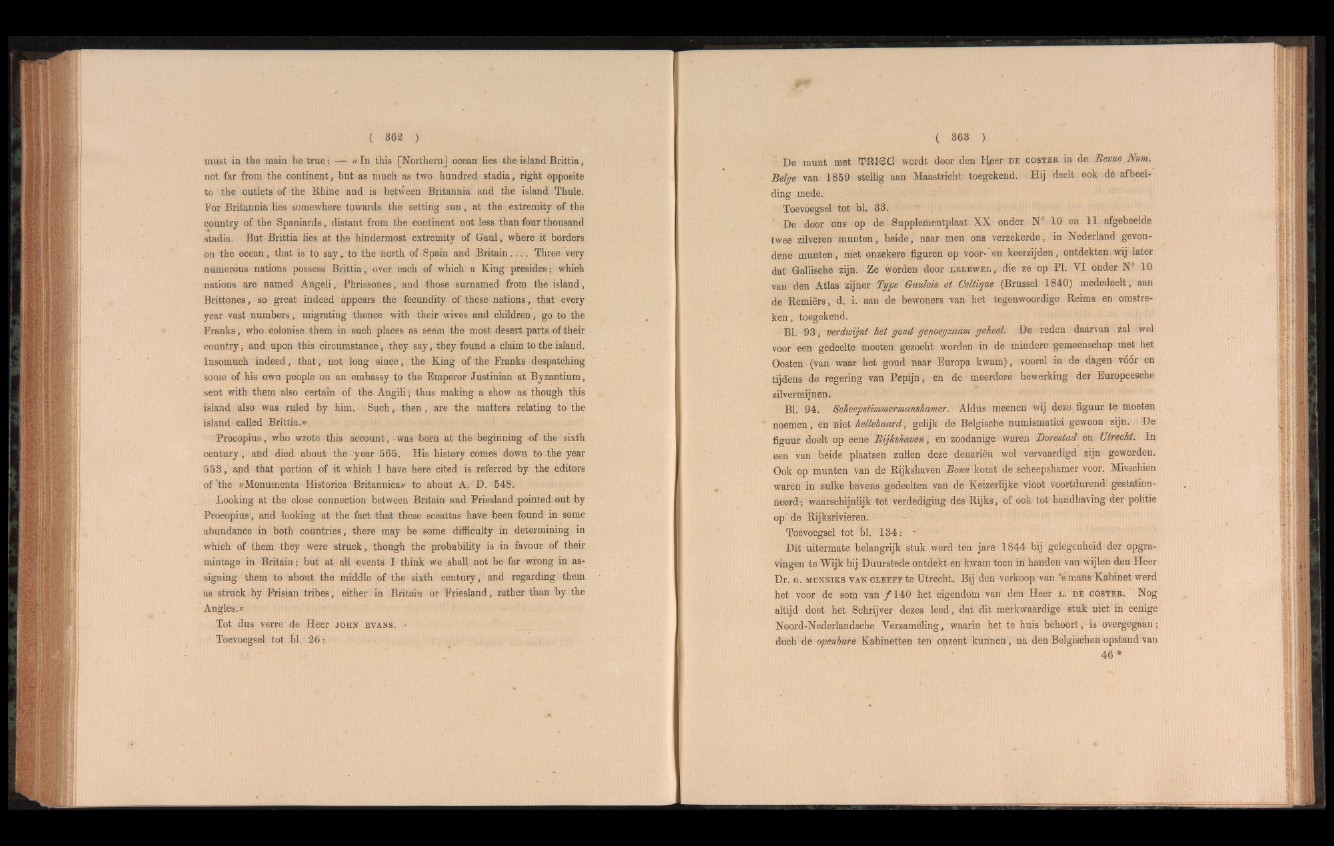
must in the main be true: — »In this [Northern] ocean lies the island Brittia,
not far from the continent, but as much as two hundred stadia, right opposite
to the outlets of the Rhine and is between Britannia and the island Thule.
For Britannia lies somewhere towards the setting sun, at the extremity of the
country of the Spaniards, distant from the continent not less than four thousand
stadia. But Brittia lies at the hindermost extremity of Gaul, where it borders
on the ocean, that is to say, to the north of Spain and Britain Three very
numerous nations possess Brittia, over each of which a King presides; which
nations are named Angeli, Phrissones, and those surnamed from the island,
Brittones, so great indeed appears the fecundity of these nations, that every
year vast numbers, migrating thence with their wives and children, go to the
Franks, who colonise them in such places as seem the most desert parts of their
country; and upon this circumstance, they say, they found a claim to the island.
Insomuch indeed, that, not long since, the King of the Franks despatching
some of his own people on an embassy to the Emperor Justinian at Byzantium,
sent with them also certain of the Angili; thus making a show as though this
island also was ruled by him. Such, then , are the matters relating to the
island called Brittia.//
Procopius, who wrote this account, was born at the beginning of the sixth
century, and died about the year 565. His history comes down to the year
553, and that portion of it which I have here cited is referred by the editors
of "the //Monuments Histórica Britannica// to about A. D. 548.
Looking at the close connection between Britain and Friesland pointed out by
Procopius, and looking at the fact that these sceattas have been found in some
abundance in both countries, there may be some difficulty in determining in
which of them they were struck, though the probability is in favour of their
mintage in Britain; but at all events I think we shall not be far wrong in assigning
them to about the middle of the sixth century , and regarding them
as struek by Frisian tribes, either in Britain or Friesland, rather than by the
Angles.//
Tot dus verre de Heer j o h n e v a n s . ■
Toevoegsel tot bl. 26:
De munt met 1MMSG wordt door den Hjser d e c o s t e r in de Revue Num.
Beige van 1859 stellig aan Maastricht toegekend. Hij deelt ook de afbeel-
ding mede.
Toevoegsel tot bl. 33.
' De door ons op de Supplementplaat XX onder N° 10 en 11 afgebeelde
twee zilveren munten, beide, naar men ons verzekerde, in Nederland gevon-
dene munten, met onzekere figuren op voor- en keerzijden, ontdekten wij later
dat Gallische zijn. Ze worden door l e l e w e l , die ze op PI. VI onder N° 10
van den Atlas zijner Type Gaulois et Celtique (Brussel 1840) mededeelt, aan
de Remiers, d. i. aan de bewoners van het tegenwoordige Reims en omstre-
ken, toegekend.
Bl. 93, verdmjnt het gaud genoegzaam geheel. De reden daarvan zal wel
voor een gedeelte moeten gezöcht worden in de mindere gemeenschap met het
Oosten (van waar het goud naar Europa kwam), vooral in de dagen vóór en
tijdens de regering van Pepijn, en de meerdere bewerking der Europeesche
zilvermijnen.
Bl. 94. Scheepstimmermanshamer. Aldus meenen wij deze figuur te moeten
noemen, en niet hellelaard, gelijk de Belgische numismatici gewoon zijn. De
figuur doelt op eene Rijkshaven, en zoodanige waren Borestad en Utrecht. In
een van beide plaatsen zullen deze denarién wel vervaardigd zijn geworden.
Ook op munten van de Rijkshaven Bonn komt de scheepshamer voor. Misschien
waren in zulke havens gedeelten van de Keizerlijke vloot voortdurend gestation-
neerd; waarschijnlijk tot verdediging des Rijks, of ook tot handhaving der politie
op de Rijksrivieren.
Toevoegsel tot t>l. 134: -
Dit uitermate belangrijk stuk werd ten jare 1844 bij gelegenheid der opgra-
vingen te Wijk bij Duurstede ontdekt en kwam toen in handen van wijlen den Heer
Dr. g . MUNNiKS v a n c l e b e e te Utrecht. Bij den verkoop van ’s mans Kabinet werd
het voor de som van /1 4 0 het eigendom van den Heer l . d e c o s t e r . Nog
altijd doet het Schrijver dezes leed, dat dit merkwaardige stuk niet in eenige
Noord-Nederlandsche Verzame'ling, waarin het te huis behoort, is overgegaan;
doch de openlare Kabinetten ten onzent kunnen, na den Belgischen opstand van
46*